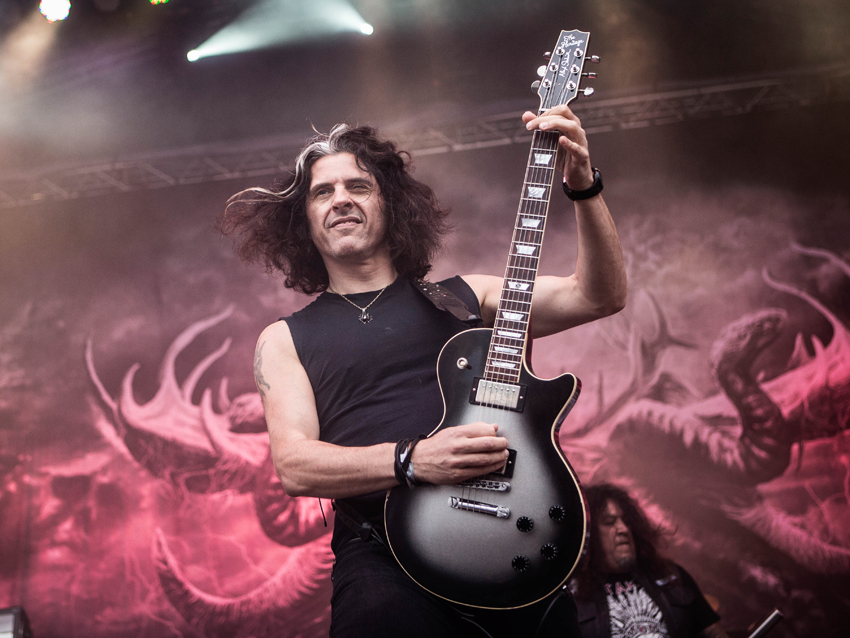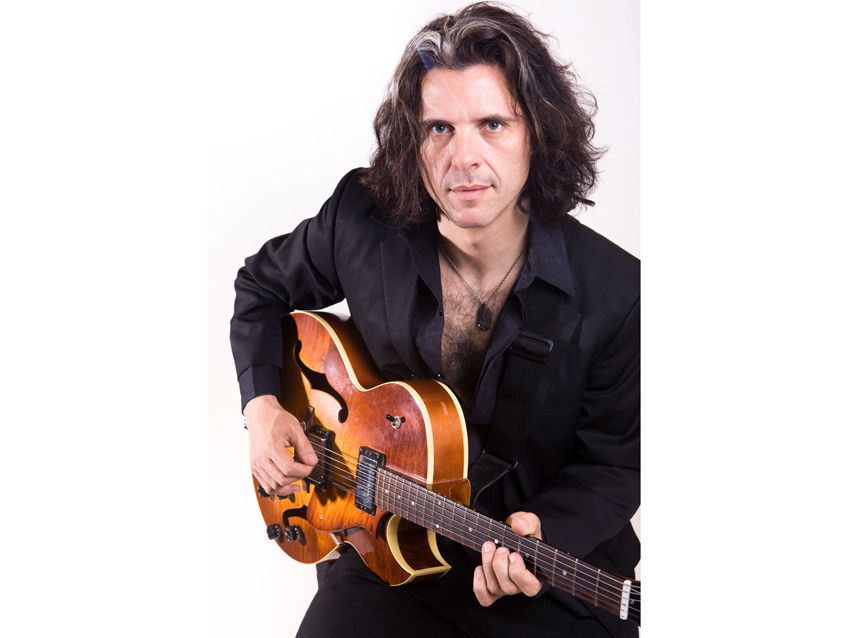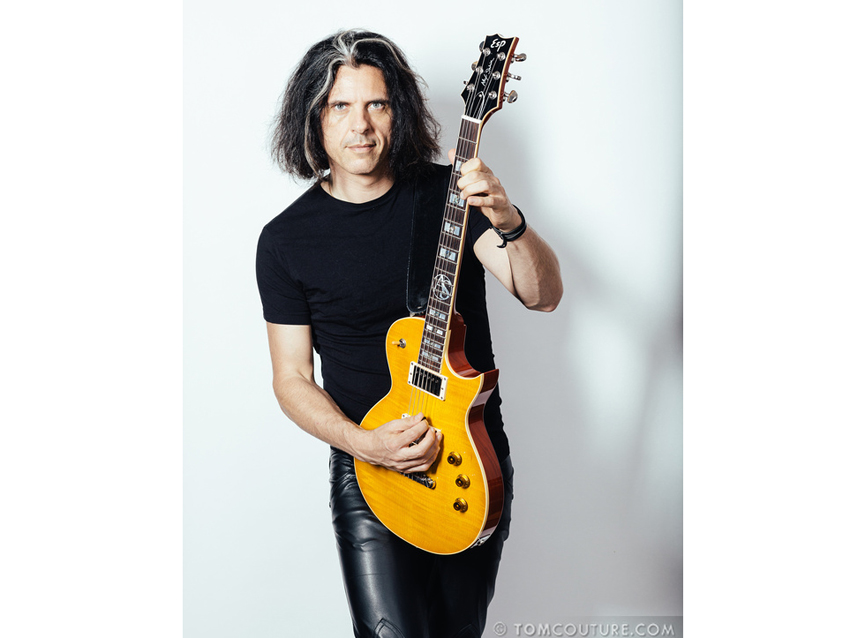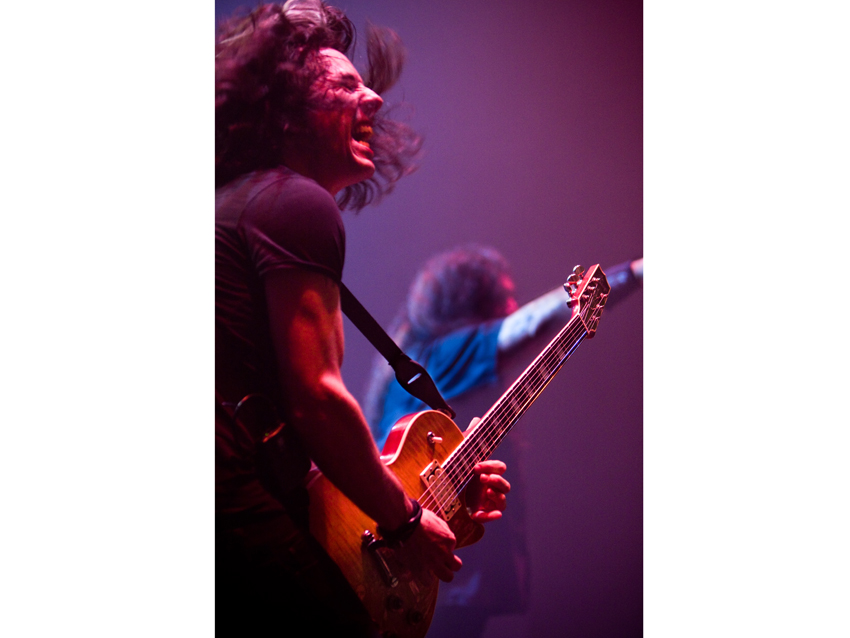
Alex Skolnick's top 5 tips for guitarists
On November 11, Testament guitarist and solo star Alex Skolnick will release an album called Planetary Coalition, which he describes as a “global music and cultural project,” featuring 14 compositions with more than two dozen artists from five continents.
While finishing the recording, Skolnick, a noted columnist for various guitar publications who last year issued a well-received memoir titled Geek To Guitar Hero, sat down with MusicRadar to share his top five tips for guitarists. On the subject of advice, we decided to ask him a few questions ourselves.
OK, these are your top tips for guitarists, but when you need a little advice or fresh insight, where do you go?
“When you’ve played guitar – or I’d imagine any other instrument – long enough to be labeled ‘seasoned pro’ or [gasp] ‘veteran,’ your perspective changes. No disrespect meant to anyone, but just to be truthful, some of the higher-profile artists you once looked up to have evolved into troubled souls whom you might not turn to for advice today.
"There is nothing like taking the risk of putting yourself out there, even if you make mistakes."
“Others appear to have been largely products of industry hype, while a select few seem to have mysteriously vanished off the face of the Earth. Yet there is a rare breed of players who were doing interesting things back then and are still developing now and have somehow managed to keep things fresh and interesting with each passing year.
“Some are well known; others lesser or little known. Recognizable names would include John McLaughlin, Jeff Beck, Pat Metheny and the late Jim Hall, for example. With the exception of Jim, who's no longer here, these all seem like healthy, creative, well-balanced individuals, and that’s been reflected in their music year after year. They are the types of artists I look to for advice.”
Do you still get in a rut occasionally, or have you learned enough Jedi Mind Tricks about the guitar to sidestep any such issues?
“I honestly don’t remember what it’s like to get in a rut. It’s always possible to find something inspiring to work on as long as you recognize that what inspires you may change over the years. For example, when I was much younger, in order to be inspired by a live music recording, I required the energy and excitement of a huge rock concert – UFO’s Strangers In The Night, Deep Purple’s Made In Japan and The Jimi Hendrix Concerts were all favorites.
“Back then, I’m not sure I’d have been as inspired by a recording of, say, Lenny Breau sitting in a remote log cabin somewhere playing guitar all by himself. Yet in recent years, Lenny Breau’s Cabin Fever album inspires me just as much as those concert albums once did.
“Nowadays, I also gain insight from talks, articles and podcasts by creative folks in other fields – writing, visual art, comedy, cooking, science and technology. There are many sources: TED talks, NPR, Brainpickings.org, to name just a few. Just find a topic that interests you and you’ll never walk away without feeling stimulated creatively and that always carries over into guitar. No Jedi Mind Tricks necessary.”
Of course, one would and could say that you never "master" the guitar – you simply keep learning and evolving. But have there been periods of your life that have ever been more fruitful as far as your development on the guitar?
“Fruitful periods on guitar may come and go, but I’ve always found that development as a player has been boosted by some form of professional incentive – a gig, a recording, a tour or any other obligation that requires preparation. There is nothing like taking the risk of putting yourself out there, even if you make mistakes.
“One of the non-musical sources of inspiration I mentioned before is comedy, and there’s a great film that comes to mind, Comedian, which shows comics, including household names like Jerry Seinfeld, developing material, and much of it clearly does not work the first time around.
“Yet these folks are not afraid to try out material, review it, mistakes and all, confront whatever isn’t working, edit, practice and come back stronger each time. I think the same process applies to music. If you’re regularly working on your playing in this manner, your fruitful periods don’t have to be punctuated by extended seasons of drought.”
We're going to talk to you in-depth about Planetary Coalition next month, but can you tell me a little more about it right now?
“Every player involved is a master musician whom I feel incredibly honored to be playing with, including some well-known folks, such as Indian vocalist and Juno Award winner Kiran Ahluwalia, Cuban drum maestro Horacio ‘El Negro’ Hernandez, Palestinian oud player Adnan Joubran and renowned Mexican guitar duo Rodrigo y Gabriela, as well as maestros of the Chinese pipa, African Kora and other great instruments not often heard by Western listeners.
“This album captures the passion of traditional musical styles – Gypsy, Middle Eastern, Mediterranean, Indian, Asian, African, Latin and others – with in-depth improvisation and rock energy. It is also my long overdue statement on acoustic guitar – always an important part of my musical palette but one that has never been fully captured until now.”
Alex Skolnick's Planetary Coalition, released through Artist Share, is available for pre-order at this link. On the following pages you can read Skolnick's top five tips for guitarists.
NEXT: Control your vibrato

Control your vibrato
“There’s a scene in the film A Bronx Tale in which Robert De Niro's character conveys some fatherly wisdom to his adolescent son who’s growing up too fast: ‘Sometimes the little head tries to tell the big head what to do.’ This is true of vibrato as well.
“Too often, vibrato seems to be in control of the guitarist, when it should be the other way around. Think about why vibrato exists: to enhance, embellish and add character to a ringing note. By violently attacking a note on guitar before it has even been struck, you become like a singer shaking his or her throat as a note comes forth. That doesn’t really work on the guitar, just as it’s a tone most vocalists would try to avoid – unless you’re Jello Biafra of the Dead Kennedys.
“Though vibrato can sound great in licks, it shouldn’t be present when practicing scales or other rudimentary exercises. If your vibrato is sounding excessive and uncontrollable, then perhaps it’s time to wean yourself off of it and go vibrato-less for a while. When you come back to it, you can sneak it in slowly. But don’t let it control you. You control it.
“Vibrato is best practiced by learning licks that use it well. Listen to players whose vibrato you like and try to match it. A personal favorite of mine is Jeff Beck, whose version of ‘Cause We’ve Ended As Lovers [Blow By Blow] has a melody that’s fairly simple to learn but with a sultry vibrato that is a terrific blueprint for how it should be done.”
NEXT: Music first ("the sound and the theory")

Music first ("the sound and the theory")
“During my first few years of playing guitar, I was sure that music theory would be better suited for someone with the intellect of an astrophysicist (of course, Brian May would have both bases covered). On paper, all of those triads, intervals, modes, chord systems, rhythmic subdivisions and other concepts were overwhelming. But over time, it all began to make sense once these theoretical components were connected with actual musical sounds.
“Not everyone needs to learn music theory – there are some terrific musicians who wouldn’t know a Mixolydian Mode from a mixing bowl (or Phrygian from a frying pan). But for many, including yours truly, a solid foundation in advanced theory has proven to be invaluable in a compositional, improvisational and professional sense.
“Whichever path you choose, it helps to keep in mind something I once heard in a workshop given by a great jazz pianist/educator in the San Francisco Bay area named Mark Levine: Music comes first. Music theory exists to help understand music. Not only that, but theory is not even accurate 100% of the time; if it were, it would be called ‘music truth.’
“Just as we don’t think of grammatical terms like adverb, present tense and preposition during conversation, musicians don’t think of theoretical terms such as 1st Inversion Triad, Melodic Minor Mode and I-IV progression while playing. Even uber-advanced guitarists like John Scofield and Kurt Rosenwinkle are no exception. Sure, these guys have spent untold hours in the woodshed absorbing sophisticated concepts, but they’ve internalized it to the point where it flows naturally, just like spoken language; they play “from the heart” as much as blues-based guitarists like Warren Haynes or Joe Bonamassa. Great players of all styles reserve left-brain activity for the practice room.”
NEXT: Doers > talkers

Doers > talkers
“Guitar communities tend to get infiltrated with obsessed talkers – laypeople posturing as experts with forthright opinions on who plays better than who, who’s good, who sucks, which effects are best, which are crap, the demo they’re working on, how they’re going to take over the scene, etc...
“The talker makes guitar and themselves the first subject of any conversation, and when the talk drifts into other subjects, they steer it right back – usually as a result of their own insecurity. Humility is a foreign substance; it can be overwhelming to be around this type of pontificating.
“On the flipside is the doer, one who doesn’t require all the focus on his or herself, who diligently works on a project without needing to announce it to all within reach, who doesn’t feel the urge to put down other musicians – and is even capable of showing appreciation and support – and who maintains a healthy relationship with the guitar – as opposed to obsession – and plays for the pure joy of it, not because they have something to prove or are trying to make up for some inherent psychological hang-up.
“The following quote of mine became my most-shared ever post on Facebook: ‘The world may be full of big talkers, but it’s the doers who are the real deal. Doers are usually humble, quiet and easy to underestimate.’
“Talkers, meanwhile, are best served with these words, courtesy of the late, great Frank Zappa: ‘Shut Up & Play Yer Guitar.’”
NEXT: Focus on what inspires you, not what's popular

Focus on what inspires you, not what's popular
“I was stopped in my tracks the first time I heard Eddie Van Halen's Eruption. I was just 12 or 13, and though I’d played for a couple years, lead guitar was never a focus. Of course, that all changed in an instant, an experience shared by other young guitarists, as well.
“For so many of us, hearing Van Halen’s early work marked the beginning of a Homeric odyssey in search of our own musical voices. It was, if you’ll pardon the pun, a call to arms.
“These dreams of creating personal musical expressions were inspired simply by hearing Eddie’s tones and musical phrases, not by the fact that he was popular or received a lot of press. I’d yet to even pick up a guitar magazine and wasn't aware of the full scope of EVH the guitarist.
“Later, as an aspiring musician keen to be up on what was ‘going on,’ I’d read every guitar magazine I could get my hands on, purchasing albums based on who was popular and whom I felt I was supposed to be listening to. But interestingly, the majority of music I purchased that way just hasn’t been that big an influence – much of it I haven’t listened to in years. Instead, it’s been the guitarists and other instrumentalists who’ve knocked me out purely by hearing them – some well known, some barely known – who’ve had the most impact on me and whom I still listen to today. This includes Van Halen, a rare example of someone whose playing drew me in and was also a very justifiably hyped guitarist.
“Though it can never hurt to stay abreast of what’s going on and who’s hot in the press, one should always seek out the music that makes you want to play purely based on the sounds you’re hearing, rather than any hype or popularity surrounding a player.”
NEXT: With great volume comes great responsibility

With great volume comes great responsibility
“The following is a not-unheard-of scenario: A stage is quiet before the pre-show soundcheck, with the exception of last minute mic-tests by crew members saying ‘Check, one, two… ‘ Suddenly, a minor issue is noticed, probably a faulty drum output or muted stage monitor. As the crew becomes diligently focused on trouble-shooting the problem, out walks the guitar player, oblivious to what’s happening.
“Like a five year old grabbing his toy Tonka trunk, he removes his guitar from the stand, approaches his six-foot-tall half-stack, plugs in a cable, flicks on the amp’s standby switch and starts blaring away at a volume that rivals Hendrix at Monterey Pop in ’67. The crew, now yelling to hear themselves, can’t do their work; only by flailing arms like airport ground support guiding a jet to the gate can they get this jerk to turn down.
“This type of thing happens all the time, not just on stage but in rehearsal spaces, guitar stores, ensemble rooms at a music schools and other places – someone barges in and cranks up the volume as if they own the place, with little or no regard for anyone else. It happens during live performances, as well – mid-show, the guitarist goes over to his amp and turns up, throwing off the front of house mix and blasting out everyone on stage.
“Just because we guitarists have amplification and the ability to turn up loud doesn’t mean we should abuse it. Use volume wisely and only when necessary, always remaining respectful of your surroundings. In the professional rungs of the music world, this type of awareness and courtesy goes a long away and is every bit as important as one’s playing ability, if not more so.”
Joe is a freelance journalist who has, over the past few decades, interviewed hundreds of guitarists for Guitar World, Guitar Player, MusicRadar and Classic Rock. He is also a former editor of Guitar World, contributing writer for Guitar Aficionado and VP of A&R for Island Records. He’s an enthusiastic guitarist, but he’s nowhere near the likes of the people he interviews. Surprisingly, his skills are more suited to the drums. If you need a drummer for your Beatles tribute band, look him up.
